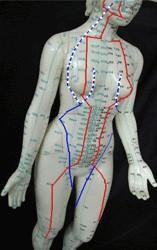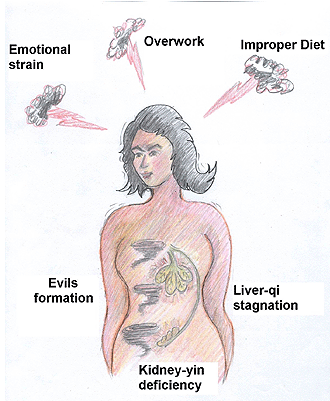From a TCM viewpoint, premenstrual syndrome (PMS) is merely categorized as a menstrual problem.
 |
| The Liver Meridian (blue) and the Stomach Meridian (red) run through the breast, chest and abdomen. |
Menstruation is a physiological character of woman, TCM claims that it appears regularly along with cyclical changes of kidney functioning. About once a month, essence (acquired and congenital) will gradually be enriched to a particular level in the kidney, which will then produce a substance called tian gui. Under the action of this substance and guided by the liver, the Conception Vessel and Thoroughfare Vessel become exuberant and flushed with abundant qi (vital energy) and blood. When the excessive qi and blood in the vessels become overflowing, they drain into the uterus and become menses. Every time when the menstrual flow eases, blood and qi will be promoted and transformed to have another cycle. This is considered a normal menstruation process and is programmed to act regularly inside the body.
PMS symptoms are closely associated with the above menstrual process, they appear before the onset menstruation and fade out gradually when the menstrual flow starts. In the beginning of menstrual cycle, the body's blood and qi are programmed to flush the Conception and Thoroughfare Vessels, which make the body in relatively deficiencies in kidney yin (essence) and blood, organ functions tend to be disturbed temporary, and accumulated pathogens (mainly led by fire evils) are standby to cause various PMS symptoms. At the end of menstrual cycle, when blood and qi redistributed and the organs resume their normal functions, the body regains its power to check the excessive pathogens and the PMS symptoms gradually disappear.
Generally, PMS development is not only resulted from fluctuated activities of blood and qi (vital energy) inside the body, but also associated with body constitution of individuals. As PMS experiences vary from person to person, and even period to period. Body constitution plays a key role in its development, an imbalance body is more easily to be disturbed by pathogens.
Lifestyle factors are essential inducing factors for PMS development. Stress, improper diet, work-life imbalance are common incidences of modern life, these unhealthy factors damage organ functions, that make the body more susceptible to pathogen accumulations and disease development.

The liver meridian runs through the breast, rib cage and lower abdomen regions; the Conception and Thoroughfare Vessels are ruled by the liver and kidney. Liver and kidney disharmonies are often involved in PMS.
When fire stagnated along the liver meridian, there will be breast tenderness, distention in the ribcage and abdomen, and irritability. Kidney and liver deficiencies that affect the spleen, causing ineffective nutrient essence production, dampness and phlegm accumulations, there will be diarrhea, poor appetite and puffiness. When the dampness and phlegm further combined with fire (mostly from the heart and liver), and block the orifices in the head, there will be mental distress, dizziness or headache.
As mentioned above, PMS can have a wide range of presentations, and they vary from woman to woman and cycle to cycle. TCM has special chapters for the common complaints, that are managed by syndrome differentiation.
Table summarizes commonly seen PMS complaints and their associated disharmonies from a TCM perspective.
| PMS complaints |
TCM disharmonies |
| Mood swings |
Heart blood deficiency
Fire accumulating in liver meridian
Phlegm and fire stirring upwards |
| Breast tenderness |
Liver qi stagnation
Stomach deficiency and phlegm accumulation |
| Headache |
Deficiency of blood and qi
Yin deficiency and hyperactive liver
Blood stasis obstruction
Phlegm and dampness obstructed in middle burner |
| Puffiness |
Spleen deficiency
Kidney deficiency
Qi stagnation |
| Mouth sores |
Hyperactive fire and yin deficiency
Heat accumulated in stomach |
| Skin rashes |
Blood deficiency
Wind-heat accumulation |




